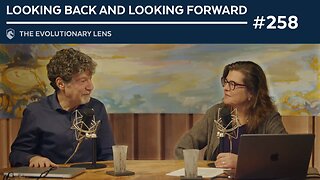Premium Only Content

THE LAST NUMBER by Augusto dos Anjos (Sapé, PB, Brazil, 1884-1914, Leopoldina, MG, Brazil)
About the author:
Augusto de Carvalho Rodrigues dos Anjos was a Brazilian poet, often identified as Symbolist or Parnassian. However, many critics, such as the poet Ferreira Gullar, prefer to identify him as a pre-modernist, as we find clearly expressionist characteristics in his poems.
He is known as one of the most critical poets of his time, focusing his criticisms on the egocentric idealism that was emerging in his time, and to this day his work is admired by laymen and literary critics alike.
He is the patron of chair number 1 of the Academia Paraibana de Letras (APL), which was founded by the jurist and essayist José Flósculo da Nóbrega and whose first occupant was his biographer Humberto Nóbrega, currently occupied by José Nêumanne Pinto. Augusto dos Anjos is also the patron of the Leopoldinense Academy of Letters and Arts.[3]
Biography
Augusto dos Anjos was born in Engenho Pau d'Arco, currently in the municipality of Sapé, State of Paraíba. He was educated in the first letters by his father and studied at Liceu Paraibano, where he would become a teacher in 1908. An early Brazilian poet, he composed his first verses at the age of seven.
In 1903, he entered the Law course at the Recife Faculty of Law, graduating in 1907. In 1910 he married Ester Fialho. His contact with reading would greatly influence the construction of his poetic dialectic and worldview.
With the work of Herbert Spencer, he would have learned the inability to know the essence of things and understood the evolution of nature and humanity. From Ernst Haeckel, he would have absorbed the concept of monera as the principle of life, and that death and life are a pure chemical fact. Arthur Schopenhauer would have inspired him to realize that the annihilation of self-will would be the only way out for human beings. And the Bible, which he also did not dispute its spiritual essence, using it to oppose, in a poetically aggressive way, the remaining thoughts, mainly the Enlightenment / materialist ideals that, deifying themselves, emerged in his time.
This philosophy, outside the European context in which he was born, for Augusto dos Anjos would be the demonstration of the reality he saw around him, with the crisis of a pre-materialist mode of production, bankrupt landowners and ex-slaves in poverty. The world would be represented by him, then, as full of this tragedy, each being experiencing it in birth and death. Augusto denies religion as something that can explain the world, his poetry is composed of many ironies against Christianity and religion in general, although in his hometown, Engenho do Pau D'Arco, the writer conducted mediumistic meetings and psychographed .
He dedicated himself to teaching, moving to Rio de Janeiro, [when?] where he was a teacher in several teaching establishments. He died on November 12, 1914, at 4 am, aged 30, in Leopoldina, Minas Gerais, where he was director of a school group. His cause of death was pneumonia. In the house where he lived during the last months of his life, the Espaço dos Anjos Museum now operates.
During his lifetime, he published several poems in periodicals, the first, Saudade, in 1900. In 1912, he published his unique book of poems, Eu, containing 56 poems. After his death, his friend Órris Soares would organize an edition called Eu (complete poems), including the original core plus 46 poems that the poet left in manuscripts or that were published only in periodicals.
-
 8:15:58
8:15:58
FreshandFit
15 hours agoElon Musk BETRAYAL & Mass Censorship On X
203K84 -
 2:25:43
2:25:43
Darkhorse Podcast
15 hours agoLooking Back and Looking Forward: The 258 Evolutionary Lens with Bret Weinstein and Heather Heying
165K211 -
 5:50:16
5:50:16
Pepkilla
14 hours agoRanked Warzone ~ Are we getting to platinum today or waaa
110K7 -
 9:15:09
9:15:09
BrancoFXDC
12 hours ago $9.11 earnedHAPPY NEW YEARS - Road to Platinum - Ranked Warzone
96.4K4 -
 5:53
5:53
SLS - Street League Skateboarding
5 days agoBraden Hoban’s San Diego Roots & Hometown Win | Kona Big Wave “Beyond The Ride” Part 2
102K14 -
 6:03:57
6:03:57
TheBedBug
17 hours ago🔴 LIVE: EPIC CROSSOVER - PATH OF EXILE 2 x MARVEL RIVALS
102K9 -
 1:12:45
1:12:45
The Quartering
15 hours agoTerror In New Orleans, Attacker Unmasked, Tesla BLOWS UP At Trump Tower! Are We Under Attack?
165K267 -
 1:32:08
1:32:08
Robert Gouveia
16 hours agoNew Year TERROR; Trump Speaks at Mar-a-Lago; Speaker Johnson FIGHT
135K112 -
 22:21
22:21
Russell Brand
1 day agoVaccines Don't Cause Autism*
206K891 -
 2:05:27
2:05:27
The Dilley Show
16 hours ago $26.99 earnedNew Years Agenda, New Orleans Terror Attack and More! w/Author Brenden Dilley 01/01/2025
120K39